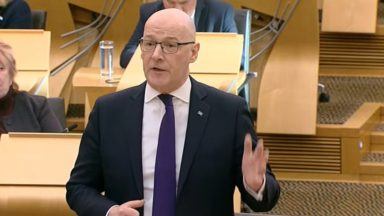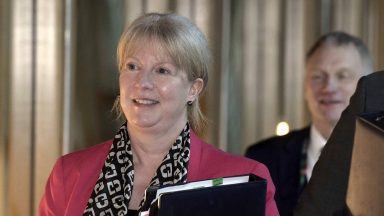It would be “unforgivable” for the Scottish Government not to release the legal advice it received about its “catastrophic failure” when investigating claims of sexual harassment by Alex Salmond after being defeated in parliament, MSPs have said.
The Scottish Government has repeatedly refused to waive legal privilege on the advice it received about the former first minister’s ultimately successful judicial review.
But after the Scottish Government was defeated in a parliamentary debate calling for it to “publish all the legal advice it received”, deputy first minister John Swinney said he will “consider the implications of the motion”.
Only the SNP MSPs voted against releasing the information, with opposition members backing the motion by 63 votes to 54.
Scottish Conservative Murdo Fraser said he expected the Government to respect the parliamentary vote and “produce the missing documentation as a matter of urgency”.
“To do otherwise would be unforgivable,” he added.
Swinney stopped short of committing to waive legal privilege following the defeat in the non-binding debate.
“Ministers always seek to respect the decisions taken by Parliament,” he said.
“I will now consider the implications of the motion with my ministerial colleagues, consistent with our obligation in the ministerial code, and advise Parliament accordingly of our response.”
In January 2019, the Court of Session ruled that prior communication between investigating officer Judith MacKinnon and two women who came forward with complaints meant the inquiry was unlawful.
Lord Pentland added the Government’s actions were “procedurally unfair and they were tainted with apparent bias”.
The Scottish Government conceded the case, paying Salmond £512,250, but questions have been raised about why the decision was taken more than two months after the damning evidence of prior communication between the investigator and complainants was discovered.
A Holyrood inquiry was set up to investigate the Government’s handling of complaints but it has accused the Scottish Government of obstruction and said it has been “completely frustrated” by a lack of evidence.
Opening the debate, Fraser said there was an “overwhelming public interest” in releasing the legal advice provided to the Government prior to the judicial review.
He said there was a “sinister and concerning” theory – pushed by allies of Salmond – that the Government was told not to defend the case because there was little chance of success.
“If that is indeed what the legal advice said, it means that a decision was taken at the top of the Scottish Government to go and defend the case regardless, a decision which – in light of what we now know – was both irresponsible and reckless,” he said.
“More worrying still is the accusation that that decision was made on political grounds and, in effect, the Scottish Government were pursuing a vendetta against the former first minister and using public funds to do so.”
While acknowledging that explanation “may well be nonsense”, he stressed that it would be impossible for the public or the committee to know without waiving legal privilege.
Fraser added: “It is surely a matter of legitimate public interest to understand this catastrophic failure within the Scottish Government and one which costs the taxpayer so dearly.”
Responding for the Scottish Government, Swinney argued that legal privilege allows “open and candid legal advice” from lawyers to Government ministers.
“It is crucial that decisions can be taken with the benefit of full and frank legal advice,” he said, expressing concern about the precedent waiving legal privilege could set for future high-profile litigation against the Government.
He added: “All of us surely must recognise the benefits for public policy and decision making for the Government to be able to benefit from being able to take legal advice which is robust, which considers all possibilities and weighs up all considerations?”
Scottish Labour MSP Jackie Baillie said the Government should provide the committee with the material it had asked for, as the First Minister had provided “no caveats” to her offer of cooperation.
Baillie said: “The committee has a job to do and, to be blunt, the Scottish Government is obstructing its work.
“Whether it is withholding information, or the sometimes apparently serial memory loss on the part of senior civil servants, it amounts to the same thing; a lack of co-operation with the committee.”
She also noted legal advice had previously been published around the Edinburgh Trams and other issues and said: “What we need to remember is that this is about the women who complained about experiencing harassment in the Scottish civil service and with all due respect, they are much more important than trams.
“They deserve the committee to do its job and understand what went wrong and why they were failed.”
Liberal Democrat MSP Alex Cole-Hamilton said he wanted the Scottish Government to “urgently expand the remit of the ministerial code investigation into the actions of the First Minister”.
He continued: “Our inquiry has been passed significant and detailed evidence that now casts doubt on the First Minister’s version of events.
“For legal reasons, this cannot yet be published but I know I speak for colleagues when I say that when we saw it, we recognised the immediate need for the ministerial code referral to be expanded to examine whether Nicola Sturgeon knowingly misled parliament.”
Follow STV News on WhatsApp
Scan the QR code on your mobile device for all the latest news from around the country




























